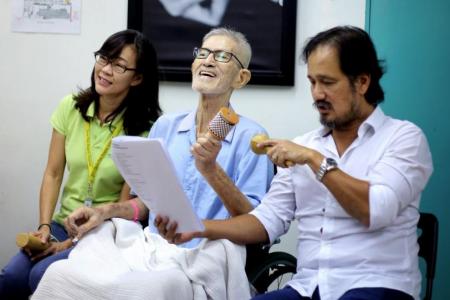Gurmit Singh gets serious – as hospice ambassador
The last time actor-host Gurmit Singh visited a hospice in the 1990s, it was to meet a fan stricken by terminal illness who was living out his last days at the facility.
He left the hospice with the impression that they are places "where you go to die".
That, coupled with a lack of knowledge about hospice care, was why he did not think of sending his father, Mr Chainchal Singh, to a hospice when the older man had prostate cancer in 2001.
As the 52-year-old and his family took on the mantle of caring for the elderly man, he admitted that he did not know many options.
His father, then 68, had insisted on living alone in the home he had shared with his late wife, mainly for sentimental reasons.
Singh's mother had died in 2001 at the age of 58 from lymphoma, less than one month after the diagnosis.
On the day of her funeral, his father found out that he had cancer. For the next six months, the older Singh lived alone in his three-room flat, an arrangement which caused much anxiety to the family.
The actor-host said: "Because I was working, it was very stressful. I left my mobile phone turned on even when I went to bed. I'd often get a call at 2am or 3am and my dad would be on the other end of the line, screaming in pain."
Singh would then rush to his father's home, "breaking a lot of traffic rules", to drive him to hospital.
That taxing period of trying to care for his father, who died in 2003 at the age of 70, played a big role in Singh's decision to become an ambassador for Dover Park Hospice last month.
The poor impression of hospices that he had was erased last year after Dover Park Hospice's chief executive Timothy Liu shared its care and home support services with him.
Singh said: "If I had known about hospice care and how the staff make patients so much more comfortable, I would have done that for my parents."
Hospice care is end-of-life care provided by doctors, nurses and social workers in the hospice or during home visits. It includes attending to the patient's physical and emotional needs, through medical treatment as well as social activities such as outings and festive celebrations.
Patients are referred to the hospice by a doctor. The referral takes into account whether a patient prefers to remain at home and the availability of caregivers.
At Dover Park Hospice, it costs $325 a day for in-patient stay, before subsidies.
The hospice, which is a secular charity, did not provide specific figures on the subsidised fees. Mr Liu said that 90 per cent of patients received different rates of subsidies "according to their family circumstances and income".
However, the hospice's home palliative care services are free, as the cost is paid for by government funding and charity donations.
Patients can be admitted within a few days once they have been assessed by a clinical team and accepted by the hospice.
For Singh, the "smartest thing we thought of doing" was to hire a maid to help take care of his father, but that came with its own share of problems.
"We had to ensure the maid knew what she was doing," said the entertainer, who is married with three children.
"There were one or two occasions when she gave my father less medicine than he needed."
Part of Singh's role as a hospice ambassador involves educating the public about hospices on social media, and taking part in Dover Park Hospice's outreach events.
Although more than a decade has passed since his father's death, Singh said the lessons learnt can still be useful for others. He is not paid for his role as ambassador.
"I don't think it's too late to talk about my own experience and share it with someone who is going through the same thing with his parents," he said.
Get The New Paper on your phone with the free TNP app. Download from the Apple App Store or Google Play Store now


